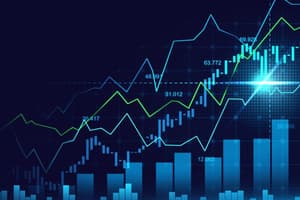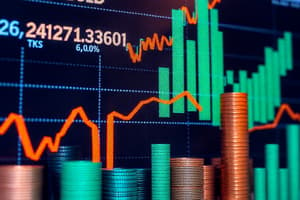Podcast
Questions and Answers
What is the primary focus of macroeconomics?
What is the primary focus of macroeconomics?
- Individual consumer behavior
- Market forces and firm decision-making
- Taxation effects on household budgets
- Economic phenomena affecting the economy as a whole (correct)
Which aspect does macroeconomics primarily deal with?
Which aspect does macroeconomics primarily deal with?
- Market forces shaping individual decisions
- Aggregate outcomes affecting large groups (correct)
- Individual consumer behavior analysis
- Effects of taxes on household budgets
In macroeconomics, what is the main area of examination?
In macroeconomics, what is the main area of examination?
- Tax and subsidy effects on individual consumers
- Economic phenomena influencing the entire economy (correct)
- Consumer behavior and market forces
- Production and pricing decisions by firms
What distinguishes macroeconomics from microeconomics?
What distinguishes macroeconomics from microeconomics?
Which area of economics involves examining actions on a larger scale affecting groups?
Which area of economics involves examining actions on a larger scale affecting groups?
What does Gross Domestic Product (GDP) measure?
What does Gross Domestic Product (GDP) measure?
What is the primary goal of central banks regarding inflation?
What is the primary goal of central banks regarding inflation?
Which of the following best defines unemployment?
Which of the following best defines unemployment?
How are interest rates defined in the context of macroeconomics?
How are interest rates defined in the context of macroeconomics?
What does macroeconomics primarily focus on?
What does macroeconomics primarily focus on?
Which concept in macroeconomics deals with the rate at which prices for goods and services rise?
Which concept in macroeconomics deals with the rate at which prices for goods and services rise?
Flashcards are hidden until you start studying
Study Notes
Economics
Overview
Economics is the social science that studies how individuals, governments, and businesses make decisions about resource allocation. It involves analyzing supply and demand, investment, production, and the distribution of goods and services. Economics is concerned with issues such as poverty, unemployment, economic growth, inflation, and international trade.
Macroeconomics
Macroeconomics is a subfield of economics that deals with the economy as a whole. It focuses on the behavior of aggregates such as national income, output, employment, and price indices. Macroeconomics also studies the relationships between these aggregates and their causes and consequences. Some of the key concepts in macroeconomics include:
-
Gross Domestic Product (GDP): This is the total value of all goods and services produced within a country's borders in a specific time period. It is a measure of a country's economic size and performance.
-
Inflation: This is the rate at which the general level of prices for goods and services is rising. Central banks typically aim to achieve a low and stable rate of inflation to promote economic growth.
-
Unemployment: This refers to people who are actively seeking employment but cannot find a job. Macroeconomists study unemployment rates and trends, and government policies aimed at reducing unemployment.
-
Interest Rates: The interest rate is the price for borrowing money from a bank or other financial institution. Central banks use interest rates to influence the overall level of economic activity by making borrowing either more or less expensive.
Microeconomics vs. Macroeconomics
While macroeconomics focuses on economic phenomena that affect the economy as a whole, microeconomics looks at individual economic units within the larger economy. Microeconomists examine consumer behavior, market forces, and how firms make decisions about production and pricing. They also look at the effects of taxes and subsidies on household budgets.
In summary, economics is the study of allocation of resources through exchange between individuals, businesses, governments, and society as a whole using various markets and institutions. Macroeconomics deals with aggregate outcomes affecting large groups, while microeconomics examines the actions of individual consumers and producers. Both fields provide valuable insights into understanding and managing economies on local, national, and global scales.
Studying That Suits You
Use AI to generate personalized quizzes and flashcards to suit your learning preferences.




